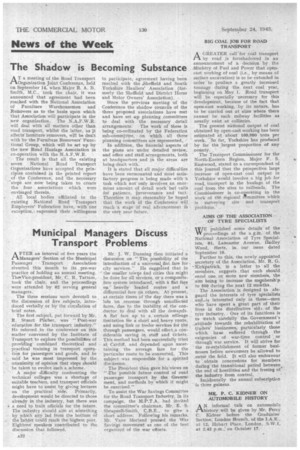Municipal Managers Discuss Transport Problems
Page 24

If you've noticed an error in this article please click here to report it so we can fix it.
AFTER an interval of five years the Managers' Section of the Municipal Passenger Transport Association reverted this month to its pre-war practice of holding an annual meeting. Tiles Vice-president, Mr. C. R. Tattam, took the chair, and the proceedings were attended by 62 serving general managers.
The three sessions were devotell to the discussion of five subjects, introduced verbally or by the circulation of brief notes.
The first subject, put forward by Mr. R. Stuart Pitcher, was "Post-war education for the transport industry." He referredto the conference on this matter convened by the Institute of Transport to explore the possibilities of providing combined theoretical and practical training in transport operation for passengers and goods, and he , said he was most impressed by the unanimity of opinion that steps should he taken to evolve such a scheme.
• A major difficulty confronting the technical colleges was a shortage of suitable teachers, and transport officials might have to assist by giving lectures on the practical side: Primarily,
• development would be. directed to those already in the industry, but there was a a need to train officials for the future. The industry should aim at something by svhias any lad from the bottom of the ladder could reach the highest post. Eighteenspeakers contributed to the discussion that followed.
• Mr: J. W. Dunning then initiated a discussion on "The possibility of the introduction of a universal flat fare for city services." He iuggetted that in the smaller 'Lawns and cities this might be done for all services, or a compositefare system introduced, with a, fiat fare on heavily loaded routes and a differential fare on others. At present, at certain times of the day there was a loss on revenue through uncollected fares, die to the inability of the conductor to deal with all the demands. A flat fare up tO a certain nfileage limitation for a short and heavy route, and using link or feeder services for the through passengers, would effect a considerable saving in staff and tickets. This method had been successfully tried at Cardiff, and depended upon ascertaining the average fare for the 'particular route to be converted. This subject was responsible for a spirited discussion.
The President then gave his views on ".The possible future control of road passenger transport by the Govern= rnent, and methods by which it might be exercised."
To assist the War Savings Committee for the Road Transport Industry, in its campaign, the M.P.T.A. had invited the committee's chairman, Mr. E. S. Shrapnell-Smith, C.B.E., to giVe a short address. Following his remarks, Mr. Vane Slorland praised the War Savings movement as one of the best organized of the war efforts.




























































